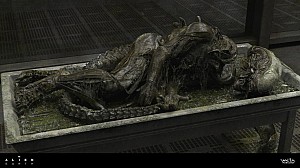Historical Reasons for Weyland Yutani’s Evil
Prometheus Forum Topic

Lucretio
MemberOvomorphJun 11, 20125293 Views0 RepliesHere is an essay I threw together speculating on how Weyland Industries - and then Weyland Yutani - became so stereotypically evil over time. Hyperlinks in the text can be found in my original article (check my profile for a link to my site). There is one quick minor spoiler about the fate of Peter Weyland, but I point it out right as I mention it.
----------
Eight decades into the future, Weyland Industries, a Joint Stock Company and mining cartel that develops interstellar terraforming while moonlighting in the defense industry, will have just over 837 million employees (beating today’s US Defense Department by 834 million), 217 million of whom live off-earth. Its valuation is $218 trillion with a T. Further into the future, after merging with the Yutani Corporation, it will have an absolute or near monopolistic power over deep space mining and colonization, in a symbiotic relationship with the Interstellar Commerce Commission and the Colonial Administration, apparent wings of the United States government and that of its allies in the affairs of outer space. Weyland Yutani, a platinum-chip, Giga-cap mega fictional corporation inhabiting the universe of the Alien series, and its prequel Prometheus, aims to “Build Better Worlds”, and harness a deadly specimen for biological warfare at any cost, including the lives of its employees, women and children, even Paul Reiser. It is the quintessential villain of the Alien series, worse than the Alien itself. As the series heroine says, “you don’t see them fucking each other over for a goddamn percentage.”
“The Fucking Company”, as it’s alternately called, was derived from the Cyberpunk and larger Science Fiction trope of anxieties over sinister corporate power in the future. It was only a subtle presence in the first Alien movie, as the owner of a ship on a benign mission to haul ore back to earth that intercepts a distress signal. The ship’s android, played by Ian Holm, receives orders to return the deadly creature back to earth after the crew encounters it, with the directive “crew expendable”. In the second film set 5 1/2 decades later, the presence of Weyland Yutani has proliferated in an ominous relationship with governments on earth, and a nearly total control of the affairs deeper into space, beyond the sight, the reach or even the sovereignty of the United States and her allies. Carter Burke (Reiser), a Company man acting on his own initiative, tries to sabotage and endanger a colony with families installed near some of the Alien specimens, so that he can procure one or two with a rescue mission led by the government’s Colonial Marines, and sneak them through customs to sell to the Company’s bioweapons division. The mission fails and the site is nuked. The Company gets a more direct third chance to seize the Alien life form on a work prison planet that is Weyland Yutani property, seemingly without any government interest in what happens.
The demand for this biological weapon starts as a curiosity of greater import than the lives of the company’s own employees, and then mushrooms into a hokey obsession that feeds more into the aura of the film series than the reality of the films universe. “It’s the chance of a lifetime”, one Company man says in the third film. You’d think there would be more destructive biological weapons in the 2170s, but considering how hapless every effort to contain this species has been (through 6 films now), making the toughest hombres look like Pauly Shore and Andy Dick in In the Army Now, maybe this penis-shaped black demon rapist is as revolutionary as the Welsh longbow. This silly cliched recurrence has slipped into the other films of writers associated with the Alien series, like James Cameron’s Avatar and Joss Whedon’s The Cabin in the Woods. In Ridley Scott’s new prequel Prometheus, the cliche persists, but we finally see this sinister corporation in a different light, as a company deeply interested in discovery. Dropping its destructive obsession, the film explains a bit on how it may have become more evil over time, if one were to compare the experience to historic corporate-state relationships concerning undiscovered worlds.
Weyland’s company began honest. In the vein of a John D. Rockefeller or a Steve Jobs, they were simply an ambitious spacefaring megacorp interested in engaging in interstellar commerce, seeking the mineral wealth space has to offer, driving up the quality of life on earth, and colonizing other planets. There is no government involvement mentioned in its endeavors, and when company founder Peter Weyland (Guy Pearce in terrible makeup) launches an exploratory mission to possibly meet our creators led by an archaeologist (Noomi Rapace), he does so entirely with his own philanthropic funds, and (spoiler alert!) he suffers the mission’s failure not only in his own pocketbook, but with his life. This is obviously a far cry from the company depicted in the original films. Somewhere between the events of Prometheus and the second film, Aliens (set nearly 8 decades later), Weyland Yutani has become entangled in the state’s regulatory regime in a crony capitalist structure that makes them at once a powerful player and lobbyist, yet capable of executing their own will, and the law, once they’re safely where no one can hear you scream.
They may have begun honest, but by the end of the Alien films’ timeline, their ethical drift became uncontrollable. Weyland Industries, it is presumed, went from ethical mining to unethical bioweapons, and throwing its own people under a moving bus, literally. Where it begins is easy to discern: right here on earth. The nature of international relations since The Peace of Westphalia, the development of nuclear weapons, the end of the ideological battles of the 20th century, and the rising relevance of non-state actors in an international liberal order has rendered many battles of the past redundant, unnecessary and impossible for self-regarding peoples. But this relative stability will surely collapse once the possibilities of harvesting the wealth of space open up. So enormous will this instability be, that it could alter the relationship between business and state altogether.
The Outer Space Treaty, which regards space as the common property of all mankind, is about as enforceable and relevant as the Treaty of Tordesillas, signed between Portugal, Spain and the decadent Pope currently being played by Jeremy Irons in The Borgias. Tordesillas divided for Spanish and Portuguese plunder the heathen lands around the globe. If the wars, undercutting, and piracy between those two wasn’t enough to undermine the original Treaty and force re-writes, the Protestant revolution that didn’t recognize Papal authority, as well as typical Frenchness made it obsolete. Mocking the Treaty, King Francis I said, “Show me Adam’s will!”, presaging Joseph Stalin’s rhetorical question centuries later, “and how many divisions does the Pope have?” The Viking settlements in North America, and the French colony in Québec, are both testaments to what can and probably will happen to empty, forgotten, and unenforced competing claims in space.
Extraterrestrial real estate will most likely be enforced on a first come, first to construct the laser beam ramparts and force field fortresses basis. Conquered and public lands in the Roman Republic and Empire were meant to be distributed rationally by the state, but wound up as handouts to the rich and powerful, or as gifts to political allies or constituents in exchange for political loyalty. The land grants in the Americas were directly tied to Royal Charter, the state, religion, and privilege. In space, the most powerful lobbyist and enforcer on earth will get what they want in a monopoly. Once that happens, the nature of the corporate power like Weyland Yutani on planets and satellites may very well resemble the government monopolies issued to the British East India Company and the Union Pacific/Central Pacific Railroad, both exploiting “uncivilized” territory. After the Pratt–Yorke opinion, whatever the British East India Company conquered in India belonged to the state’s sovereignty (the Crown), as opposed to land acquired by treaty with local Princes. Anything in space that Weyland Yutani seizes is in the enforceble domain of the United States government, who send in their Colonial Marines to infrequently enforce protection and the rule of law. The land granted for the construction of the Transcontinental Railroad really wasn’t ours to give but for an antiquated sense of entitlement, and the government had to fight many a Native tribe to protect the railroads and settlements and “develop” the West, to keep their companies safe.
The insecurity of enforcing vast new finds throughout space from piracy and national conquests will inevitably lead to a ratcheting up of military-corporate-government ties, which may or may not extend to earth’s social structures. The sovereignty of The Interstellar Commerce Commission’s quarantine seemed to have been an issue for Carter Burke, who would have had to jump a hurdle to get the Alien back to the company labs for a profit, so perhaps there is some hope for the rule of law at home in the Alien film universe. But earth or space, private or state endeavor, it may well all blend together. The competition can eventuate into violence, as the London Company that settled Jamestown can attest, it will eventuate into the Ohio Company, which found itself dead smack in the middle of New France, provoking the French and Indian War. Private mercenary armies, like those employed by the British East India Company will become necessary, as well as closer relations between the state and corporations to protect their own claims unrecognized by say, Russia, China and India.
James Cameron compared the Colonial Marines, who have government jurisdiction over the rescue mission, to the British Navy’s support of the East India Company. The profits of the East India Company raise another possibility: the envious bureaucrats on earth who may lick their chops when Weyland Yutani starts bringing home the bacon, and the politicians force themselves into regulatory battles with the Company until the two are entangled in a corporatist structure, like Parliament eventually did to the East India Company in the 18th century. After King Charles II drafted charters for the EIC to have monetary, military, and judicial power over their lands in India, that set the ball rolling in the accumulation of direct state control over the Company, which was too feeble and untrained to administer Indian society, and to execute justice to keep the heathen natives in line. The more government and company were mixed, the more abuses rang loudly, from the inability to stop Henry Every committing the greatest act of piracy in history to the 19th century rebellion that began the British Raj.
The necessity of protection from the competition and violence of rivals inevitably leads to corporate-state synthesis and monopoly. Things went a lot better when the East India Company was just a Joint Stock Company, that developed at a far faster pace than its Dutch corporate rival and French and Portuguese state rivals through a less centralized administration, and not as a falsetto Leviathan charged with administering justice and a central bank. But enforcing their claims in India during the Seven Years War led to a massive uptick in state control. At the beginning of Aliens, our heroine Lt. Ellen Ripley (Sigourney Weaver) is under investigation at in inquest ran by Weyland Yutani in connection with the Interstellar Commerce Commission and the Colonial Administration. She might as well have been investigated by East India Company officers in India circa 1675, or Fiat executives in 1940, Mussolini’s henchmen with handcuffs at the door, ready to follow the CEO’s orders. Ripley seemingly lived and died at the behest of Weyland Yutani, the fellas great at interstellar mining, but hopeless at capturing overgrown bugs. The Company’s adjudication of its own affairs seems to have been unquestioned by the state, but overseen in a kind of mission creep. By the fourth Alien movie, set hundreds of years later, the human race is seemingly all one military-corporate social structure, in the vein of a Soviet bureaucracy.
I would speculate that given this high intensity collusion between state and corporation, and the immensity of Weyland Yutani in the interstellar economy, it could very well exist with heavy government subsidy to cover losses. If we are to evaluate corporations as people, and determine them to be psychopaths, we could draw some lessons from the Roman Republic and the American West in how that psychopathy emerges with other people’s “free” money. In the 3rd century BCE, Roman Senators issued contracts and indemnities to the capitalist Knights to conduct commerce overseas in a primitive form of state capitalism during the Second Punic War. One Knight, Marcus Postumius, was given state funds to build ships and trade overseas, with guarantees on any losses. He quickly loaded a ship up with worthless cargo, sank it, and collected his exaggerated dues. He was only spared punishment because the statist Senatorial class couldn’t afford to upset the Knights, whom they relied upon. And similarly, leading up to the Crédit Mobilier scandal, the US government issued 30-year bonds, and land grants (surrounded by hostile Native Americans) in order to connect the nation with the Transcontinental Railroad. Congressman Oakes Ames and his brother, straddling both government and corporate power, filled sacks with government money and ran, as every railroad involved in the state-run project to conquer the vastness of new territory went bankrupt, and Crédit Mobilier began charging itself double the price for every stretch of railway, costs incurred by the US taxpayer. The only railroad to avoid bankruptcy was The Great Northern, which also avoided government bonds.
If Weyland Yutani is an incomparable lobbying power on earth, ominously close to governance like a Halliburton or a Bechtel, with no-bid contracts and intimate relationships with politicians crowding out the Company’s competition, and they can execute any justice that falls in the jurisdiction of their outer space colonies and claims, and any losses of giant ships and colonies to nuclear blast (care of Lt. Ellen Ripley) are possibly covered by the taxpayer in a crony capitalist bailout structure of a Too Big to Fail monopoly and the chief manufacturer of the government’s weaponry …. well good gravy people, that right there is where you get your sinister corporation. That’s the genesis of “the fucking company” that not only doesn’t care if cute little girls are eaten by monsters, but actively tries to encourage the act, with zero concern for private profit or public loss. Wheresoever governments charge corporate monopolies to pursue the state’s interests, while freed from the rule of law, be it in the ancient, the first, the third or even other worlds, heinous acts will ensue.
Replies to Historical Reasons for Weyland Yutani’s Evil
Hey Guest, want to add your say?
Are you an avid Alien fan looking for a dedicated online community of likeminded fans? Look no further! Create your own profile today and take part in our forums and gain XP points for all the content you post!









